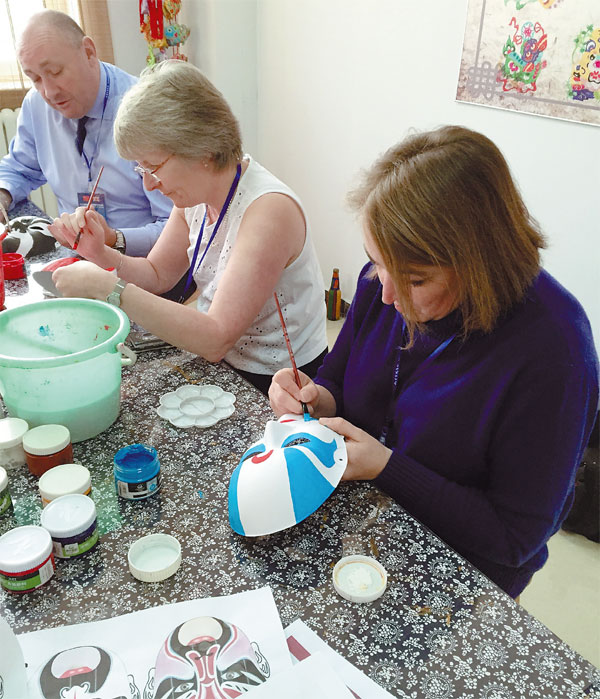 |
|
British rectors in this delegation paint Peking Opera masks in a language school in Tianjin. Zheng Xin / China Daily
|
Britain hopes to double the number of students learning Chinese by 2020.
The number of schools offering Mandarin classes is growing throughout the United Kingdom, according to cultural and education section of the British Consulate-General in Shanghai, as UK educators hope to open future doors for the nation's youth.
The report by the education department coincides with an eight-day visit by 59 British rectors, mostly from Great Britain and Northern Ireland, to Chinese primary and middle schools from Oct 26 to Nov 2 in such cities as Tianjin; Suzhou, Jiangsu province; Chengdu, Sichuan province; and Zhuzhou, Hunan province.
The visit, organized by the Confucius Institute, the Office of Chinese Language Council International (commonly known as Hanban), and the consulate's cultural and education section, aimed to promote the benefits of learning Mandarin in the UK's primary and secondary schools, which cover the ages of 4 to 18.
"The visit was meant to help schools from China and the UK to share information and build partnerships, while advocating for a wider recognition of language benefits," says Wang Haiyan, a staff member with the consulate's cultural and education section.
"Many of the rectors from the UK are interested in introducing Mandarin as part of their regular primary and secondary school curriculums," she says.
Paul W. Thomson, rector at Jordanhill School in Glasgow, Scotland, which is funded by the Scottish government, says he is very interested in offering the school's students courses in Mandarin.
Thomson says all children from Jordanhill School are taught French for six years, from the ages of 10 to 15, and around 20 percent of students also study Spanish.
He says that since "young people of all ages are excited and interested to learn about China and develop an understanding of Mandarin, while many of our older students are keen to visit China", Jordanhill School is considering introducing Mandarin as a foreign language requirement.
The Scottish government is introducing an education policy called "Modern Languages 1 + 2" that will teach students a foreign language at the age of 5. It would then teach them a second one from the age of 9. The plan will go into effect by 2020.
"We will almost certainly teach French as a second language from the age of 5, but we are looking at the feasibility of introducing Mandarin," Thomson says."It is important that our young people develop an understanding of China, similar to that which they might have of Europe and the United States, and take that understanding with them as they move to higher and further education and the world of work."
Barry Morrell, assistant head teacher of Kenton School in Newcastle, which has been offering Chinese language classes for two years, shared Thomson's sentiment.
"We want to prepare students for life in a global world," Morrell says. "We believe that for some students the ability to talk Mandarin will open doors for them in the future, and China is a very ancient and interesting culture and the country is growing and will become a feature of all our lives in the future."
According to Kenton educators, among all foreign languages offered, including Spanish, French, German and Mandarin, students find the Chinese language a very difficult language to learn, more so than European languages.
Morrell says that "in addition to a local native Chinese person who speaks excellent Mandarin and English", the school also utilizes staff members from the Confucius Classroom to deliver after-school lessons in Mandarin and tai chi.
"We will be looking seriously at our options in relation to exchanges with the primary schools in China who we have partnerships with."
Thomson at Jordanhill says there is an acute shortage of qualified Mandarin teachers in Scotland, one of many hurdles that has prevented the school from coming up with a Mandarin class.
"We are looking to work with the local Confucius Institute, Hanban and our partner school Weishanlu High School in Tianjin to address this issue," Thomson says.
"I have already made contact with Fan Li, the coordinator at the Confucius Institute, to explore the feasibility of establishing a Confucius Classroom at Jordanhill School. If this option seems feasible, we would apply to Hanban and also to the British Council for support."
According to the British Council, head teachers at UK schools where Mandarin is taught are convinced that offering Chinese classes is an important contribution to a student's broader educational attainment and to their understanding of the world.
Research into Chinese-language learning in the UK from 2013 to this year, conducted by the British Council and Hanban, shows that 3 percent of primary schools, 6 percent of state secondary schools and 10 percent of independent schools currently offer Mandarin in their curriculums. The annual average growth over the next five to 10 years is forecasted to be between 4 and 8 percent, according to the report by the consulate's cultural and education section.
"I want Britain linked up to the world's fast-growing economies, and that includes our young people learning the languages to seal tomorrow's business deals," said UK Prime Minister David Cameron in December 2013.
"By the time the children born today leave school, China is set to be the world's largest economy. So it's time to look beyond the traditional focus on French and German and get many more children learning Mandarin."
